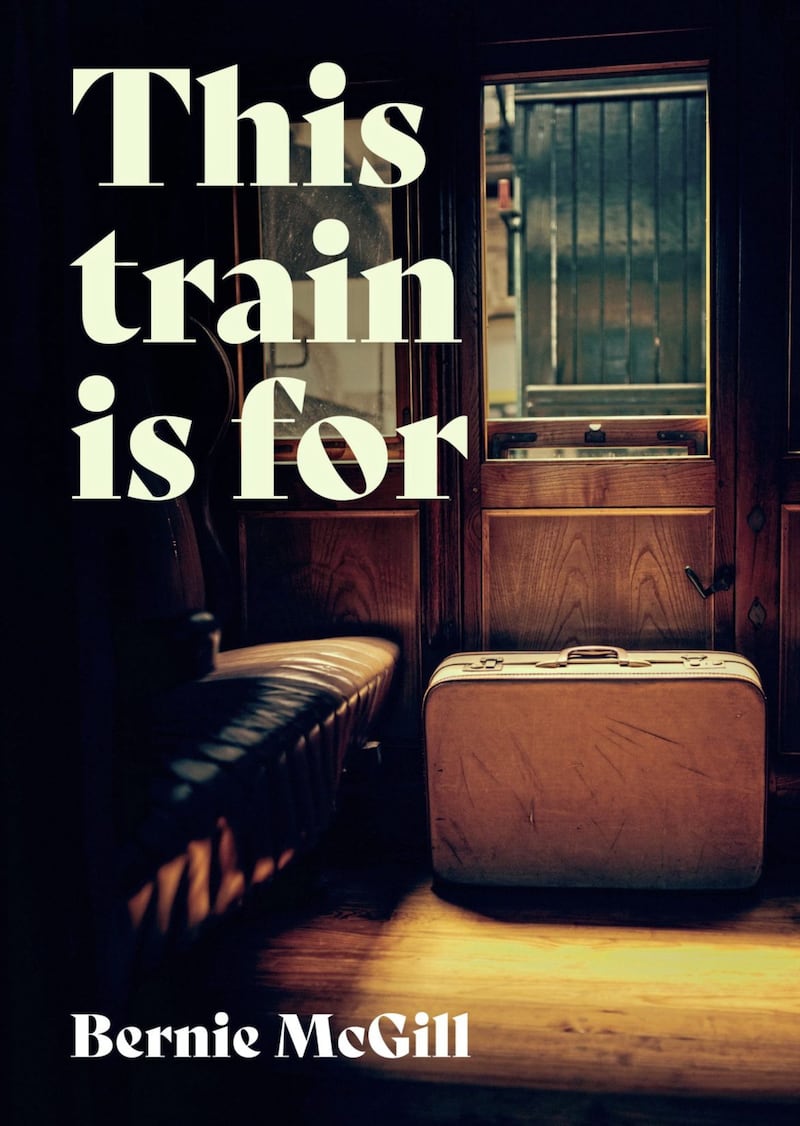"I SPENT a lot of time on the train – or I used to," explains author Bernie McGill of the inspiration behind the titular tale in her new short story collection, This Train is For, which involves locomotion, place names, foolish pride and family estrangement.
"I was travelling up and down to Queen's most of the time, from Portstewart, getting the train from Coleraine to Botanic," continues McGill of her daily commute during a two-year writing fellowship at Queen's University with the Royal Literary Fund.
"I wasn't getting a lot of writing time, so I started doing a bit of note-taking on the train and trying to make the most of that journey time – literally looking out the window and writing down what I could see."
"A train journey is a peculiar experience: in the car, there's lots of directions for you in the form of physical signage, but on the train you're travelling over land on which there are no other pathways. In-between stations I was thinking, 'I don't even really know where I am'."
However, the unnamed train passenger who narrates This Train is For is a keen student of our local geography, a retired town planner fascinated by local place names and their origins: he knows, for example, that Ballybrakes derives from "the speckled townland, or town of the badgers, depending on which interpretation you favour" and that nearby Ballymoney means 'townland of the bogs'.
"Tullans, Windy Hall, Knockantern, Loughanreagh, Fish Loughlan, Coolderry, MacFinn. This is what it feels like to travel through history," he muses.
"This is what we do here: move forward while facing back, keeping a sharp eye on what has been in case it gets a run on us, overtakes us on our blindside."
"I did a lot of research about where we actually were travelling through and the etymology of those places and how they got their names," explains McGill of creating the short story that opens her latest collection, which was published last week by No Alibis Press.

"That train also stops at Belfast City Hospital. From time to time you'd overhear conversations about going to visit patients or going for treatment of some kind. So I started to think about a character who might be on their way to the hospital for whatever reason.
"Eventually, I decided he was visiting a family member and that there had been a rift of some kind – and then I was curious about what that might have been."
As readers will discover, said rift is a depressingly familiar tale of a family split rooted in sectarianism which should resonate with fans across the north in particular.
"I suppose the political history of this place is never too far from any of our minds and the ways in which families do come asunder for all kinds of reasons," offers McGill, whose last short story collection Sleepwalkers was published in 2014 to great acclaim in-between her pair of hugely well received historical novels, 2010's The Butterfly Cabinet and 2017's The Watch House.
"Those hurts are deeply rooted in lots of families here and the legacy of that does get carried forward sometimes. Over time, hopefully people soften and realise it wasn't worth it to rip their family apart for something so utterly ridiculous."
Families and their often troubled, hidden/secret histories involving painful/traumatic events provide a key theme which connects the 12 stories in This Train is For: refreshingly, McGill favours 'unconventional' family backgrounds in her writing here – adoption and fostering feature repeatedly – with the inter-personal dynamics rarely cordial or straightforward.
It's all ideal fodder for more interesting stories and characters, as she explains.
"Nobody is interested in reading about families where there's no strife," chuckles the Co Derry-born author, who is based in Portstewart and works as mentor with the Irish Writer's Centre and as a Writer in Schools with Poetry Ireland.
"I don't have have any connection or personal experience with [fostering or adoption] at all, but I think maybe it just adds to that idea of people being a little bit out of kilter, feeling a little bit dislocated and displaced, and why that might be.
"Also, that idea of feeling placeless – that they don't have a place or maybe you just haven't found it yet."

One of the most intriguing stories in This Train is For is The Escapeologist, in which a student, Callie, awakes to discover a little boy in her room, dripping wet and seemingly displaced in time/space. Who he is and where he's come from is never made entirely clear, with McGill very much leaving it up to her readers to bring their own interpretations to this memorable tale.
"That one is kind of a mystery to me as well," admits the author and playwright, who says she often simply "follows" the characters she creates in order to find out what happens to them – a method she took to extremes with this story which was originally commissioned by Fortnight magazine.
"The character who provides the POV, Callie, I don't really know where she came from. But I decided to stay with her to see where she led me.
"It's not the kind of story I normally write. I was aware that I wasn't as clear about why I was writing or what it was going to be, but I sort of just decided that I'd give myself up to it and see what happened.
"My friend Paul McEneaney from Cahoots theatre co is a magician and a while ago I'd been talking to him about writing something about magic. He'd leant me lots of books which I pored over and I had lots of notes, so when Fortnight asked me for something, I just started to write.
"I wrote it quite quickly in the end and when I gave it to a few good friends to read before it was published, every one of them had a different theory about what it was about. I liked that – so I'm quite happy that it's open to interpretation."
McGill will be collecting plenty more feedback on The Escapeologist and the rest of This Train is For now that it's been published – and it seems this is something she's still adjusting to even at this stage of her well-established writing career.
"It's always a wee bit of a shock at first," admits the author, who will be launching the new collection with a special event at No Alibis in Belfast tomorrow evening.
"You've been living with these characters and stories for so long on your own and then when somebody asks you about them for the first time it feels a little bit intrusive in some ways – I almost want to say, 'But how do you know them?!', as if they are prying into your private life.
"But you get used to it after a while: you realise that it doesn't belong to you any more, you've given it out to whomever wants to it and that's exactly what you're supposed to do."
:: This Train is For is out now, published by No Alibis Press. Bernie McGill will launch the new book on June 9 with a special appearance at No Alibis on Botanic Avenue in Belfast, at 6pm. See noalibispress.com for details. Bernie will be in conversation with author David Park and Emma Warnock from No Alibis Press at the Belfast Book Festival on June 17 and also with author Rosemary Jenkinson and Emma Warnock at Seamus Heaney HomePlace on June 25. See belfastbookfestival.com and seamusheaneyhome.com for details.






